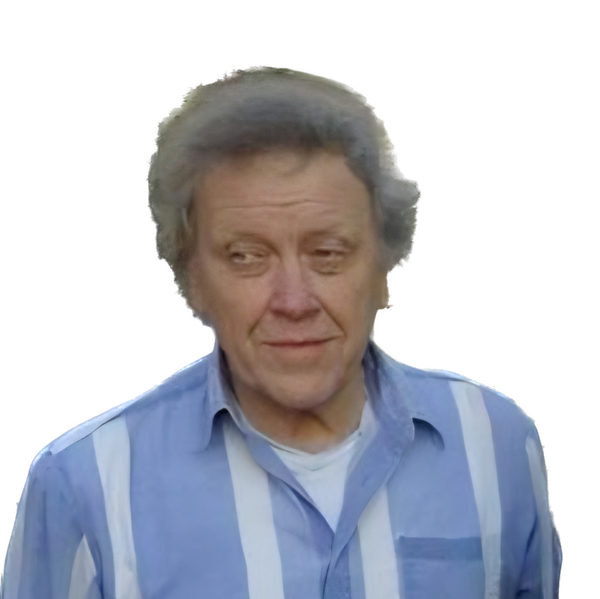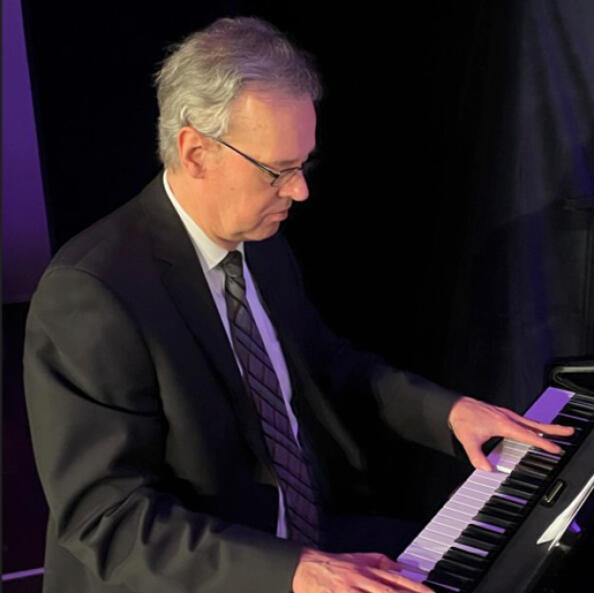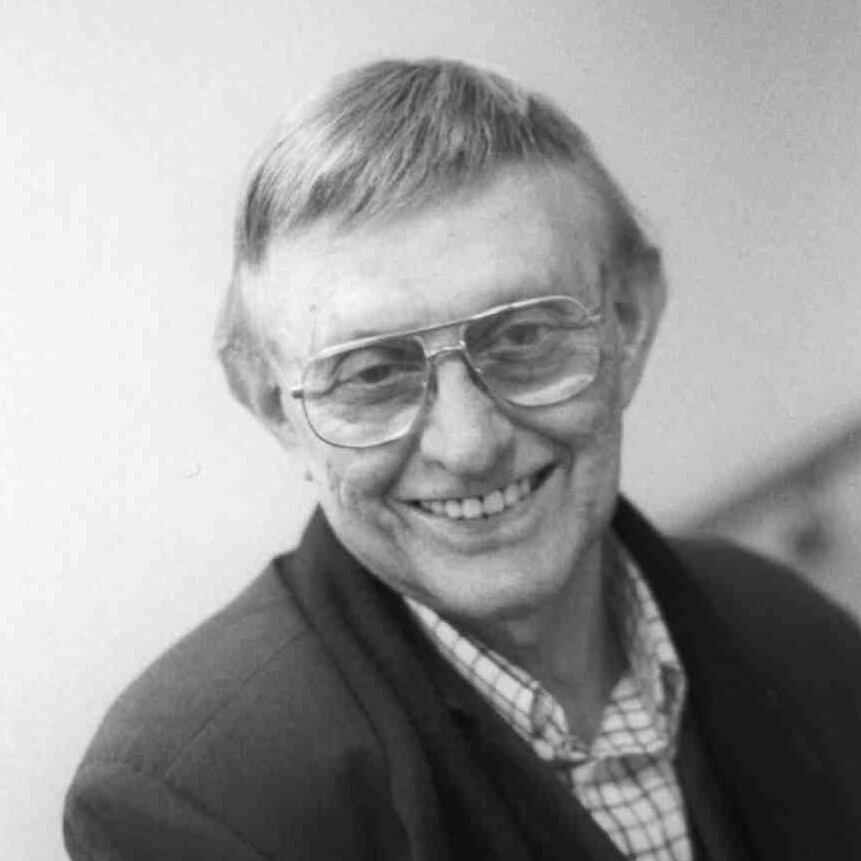Peter Feuchtwanger
Society e.V.
The Peter Feuchtwanger Society was founded in 2018 in memory of Prof. Peter Feuchtwanger - pianists, pedagogue and composer who mentored and worked with many of the world's leading pianists, such as Martha Argerich or Shura Cherkassky. He was an adjudicator at many international piano competitions and acted as Vice President of the UK branch of EPTA (European Piano Teachers Association). He held part-time professorships at the Mozarteum Salzburg, the music universities in Karlsruhe and Basel, and was a visiting professor at the Yehudi Menuhin School in England.
The Peter Feuchtwanger Society intends to disseminate and develop Prof. Feuchtwanger's pedagogical concept, and wants to promote his compositions in performances and publications. The society organises the annual Feuchtwangen Piano Symposium - a four-day event of lectures, workshops and a public concert.
It also establishes an archive in order to support and facilitate musicological and pedagogical research projects related to the work of Prof. Feuchtwanger. It is also our aim to to promote Feuchtwanger's compositions through performances and future publications.
For further information, please refer to the top menu of this page. In addition, under "Blog" you can find a collection of analytical articles and personal essays written by members of our Society and former students which elaborate on the work and life of Peter Feuchtwanger.
Events
Below you will find information on events organised by the Peter Feuchtwanger Society and its members.Prof. Peter Feuchtwanger was Vice President of the European Piano Teachers Association (EPTA) in Great Britain for many years, so we would also like to draw your attention to EPTA events in Germany and Europe.
22. - 24. April 2025
Feuchtwangen Piano Symposium
91555 Feuchtwangen, Bayern
Weitere Informationen: Piano Symposium
03. Mai 2025, 10:00-17:00
Workshop Klavierübungen - Masako Kamikawa
85521 Ottobrunn, Bavaria, Germany
Weitere Informationen: Workshop Ottobrunn
17. Mai 2025, 10:00-17:00
Workshop Klavierübungen - Masako Kamikawa
35781 Oberlahn/Weilburg, Hessen, Germany
Weitere Informationen: Masako Kamikawa
30. Mai - 1. Juni 2025
EPTA-Seminar „Zwischen Werktreue und Improvisation“
Martin-Luther-Universität Halle (Saale), Sachsen-Anhalt
Weitere Informationen: EPTA Deutschland
12. - 14. Sept 2025
Workshop Klavierübungen - Masako Kamikawa
16831 Rheinsberg, Brandenburg
Weitere Informationen: Workshop Rheinsberg
12. - 14. Sept 2025
Workshop Klavier "Technik und Interpretation“ - Birgit Nerdinger
(u.a. die Klavierübungen von Peter Feuchtwanger)
89415 Lauingen, Bayern
Weitere Informationen: Workshop Lauingen
07. - 10. April 2026
Feuchtwangen Piano Symposium
91555 Feuchtwangen, Bayern
Weitere Informationen: Piano Symposium
The Peter Feuchtwanger Society bids farewell:

MICHAEL GARADY
*18. September 1933 - † 13. August 2025
The Peter Feuchtwanger Society mourns the loss of its honorary member Michael Garady, who passed away in August 2025. To the public, he was primarily known as a painter, but to us he was also a wonderful music lover and, since the 1950s, Peter Feuchtwanger's life partner.With self-deprecating modesty, he often referred to himself as the person who taught Tennessee Williams how to draw. Yet his paintings and drawings of Clara Haskil, Youra Guller and other outstanding artistic personalities of the 20th century travelled around the world almost as much as Williams' works.We will miss his charm, his quick wit, and his immense musical life experience which has given us such a rich pool of insightful anecdotes and musical wisdom.
-------

KLAUS CUTIK
*8. März 1961 - † 7. April 2024
Music was his life. For him, the ethos of passing on was the happiness of being.Klaus Cutik was a student and long-time assistant of Prof. Feuchtwanger. He founded the social media group "Quickrelease", was a board member of the Peter Feuchtwanger Society e.V. and played a leading role in organizing the Feuchtwanger Piano Symposium for several years. His and Peter Feuchtwanger's teachings will live on in us and inspire us to pass them on.Our deepest sympathy goes out to his family and all those who loved and appreciated Klaus.
About

Peter Feuchtwanger (1930 - 2016)
Born in Munich, Germany, Peter Feuchtwanger studied piano with Gerti Rainer (a pupil of Emil von Sauer), Max Egger, Edwin Fischer and Walter Gieseking. According to his own account, his greatest musical influence came through his encounter with the Rumanian pianist Clara Haskil, and his intensive studies of the bel canto tradition of the "golden age of singing". He gave up an early successful career as a concert pianist in order to devote himself to composing and teaching.
Prof. Peter Feuchtwanger adjudicated at many international piano competitions and was Vice President of the EPTA UK (European Piano Teachers Association). He has held part-time professorship at Musikhochschulen in Karlsruhe and Basel, and was a visiting professor at the Yehudi Menuhin School in England, in South Korea, the United States, and Brazil.
Feuchtwanger achieved his international recognition due to the exceptionally high standard of the masterclasses he held throughout the world since 1967. He taught at the Dartington International Summer Scholl, the Schleswig-Holstein Festival and the Schubertiaden Schnackenburg (Germany), at Bösendorfer's in Vienna and the International Summer Academy at the Salzburg Mozarteum (Austria), at La Roque Danteron (France), and the Festival Tibor Varga in Sion and the Musikalische Begegnung Lenzburg (Switzerland). Further took place in the UK, Germany, France, Switzerland, The Netherlands, Israel, Sweden, Norway, Finland, Belgium, Japan, South Korea, the United States, and Brazil.
Throughout his life, Peter Feuchtwanger dedicated some of his time to composing. He studied composition with Lennox Berkeley and Hans Heimler (a pupil of Alban Berg, Heinrich Schenker and Felix Weingartner). He also studied Indian and Arabic music and philosophy with Nazir Jairazbhoy and Dr. Arnold Bake - all of which influenced much of his work. Peter Feuchtwanger first received international recognition as a composer with his "Variation on an Eastern Folk Tune (Books 1 and 2)", which won 1st prize at the International Viotti Composition Competition in 1959.In 1966, Yehudi Menuhin commissioned him to write a work for violin, sitar, tabla and tamboura which Menuhin and Ravi Shankar performed at the Bath Festival that same year. This led to the worldwide successful recording "East meets West". Further compositions have been published by Augener's, Galliard and Galaxy and/or published in recordings for the BBC Radio 3, the German, Swiss and Japanese radio, and Swedish television.
For more extended information on Peter Feuchtwanger - including photos, and several of his texts and essays - please refer to the multi-language website: peter-feuchtwanger.de
Symposium
New Dates
07.-10. April 2026
We are happy to announce that the next edition of the Feuchtwangen Piano Symposium takes place during the days 07th - 10th April 2026. The three-and-a-half day event will include a participants' concert at the town hall "Kasten":
Tue 07. April, 11am - 7pm: Symposium with Lectures & Workshops
Wed 08. April, 9:30am - 7pm: Symposium with Lectures & Workshops
Thur 09. April, 9:30am - 5pm: Symposium with Lectures & Workshops
Thur 09. April, 7pm: Public Concert at the City Hall „Kasten“ (Am Kasten 2, 91555 Feuchtwangen - Entry fee: 10/6 Euro, free for participants of the symposium)
Fri 10. April, 9:30am - 1pm: Symposium with Lectures & Workshops
Location: Sängermuseum Feuchtwangen, Am Spittel 2-6, 91555 Feuchtwangen, Germany
For more detailed information about the upcoming and previous editions of the Klaviersymposium:
Costs & Registration
Fee for participants for the entire symposium, including all lectures, workshops & the public concert:
75€ for general public
50€ for members of the Peter Feuchtwanger Society e.V.
For any further questions, please contact us via Email:
Tradition
For several decades, Prof. Peter Feuchtwanger (1930-2016) conducted master classes and workshops in many parts of the world, among those also in Feuchtwangen, Germany. He was especially fond of this town in Bavaria as that's where his 16th century ancestors originated form. From 1987 to 2015, he gave a yearly master class teaching many students his method of attaining a healthy and natural piano technique and a cantabile way of playing.
Since his passing in 2016, former students continue this tradition with a three-day symposium which includes several workshops and a concert. The aim is to exchange and spread their knowledge and experiences among the many colleagues and students who are interested in learning about Peter Feuchtwanger and his teaching.We are very grateful that the symposium is supported by the city of Feuchtwangen.
Structure
The Feuchtwanger Piano Symposium consists of various elements:
Lectures on interpretation, repertoire analysis and historical performance practice - as taught by Peter Feuchtwanger
Practical workshops on physiological aspects of piano technicque, including Feuchtwanger's "Piano Exercises for Curing Playing Related Disorders and for Acquiring a Functional and Natural Approach to Piano Playing" (conducted by former assistants of Prof. Feuchtwanger)
Workshops on Alexander Technique and Quigong
Lectures on more recent research and teaching experiences related to Feuchtwanger's work. The lectures are meant to be very practical and interactive, showcasing many examples at the piano
Participants
The symposium and workshops are best suited for professional pianists, piano students, pedagogues and music enthusiasts who are especially interested in the world of piano playing. We especially want to encourage younger students (14 years and above) to participate as we believe that getting to know Peter Feuchtwanger's approach is even more beneficial at the beginning of your musical journey.
Archive
The Peter Feuchtwanger Society Archive is in the process of establishing an Peter Feuchtwanger Archive. The aim is to set up a publicly accessible reference inventory as well as a digital inventory that is made available online for the following purposes:
Research & publication on Peter Feuchtwanger’s “Piano Exercises for Curing Playing Related Disorders and for Acquiring a Functional and Natural Approach to Piano Playing”
Publication of sheet music material with detailed notations and examples of fingerings
Research & publication of Feuchtwangers unpublished compositions
Research & publication on the life Peter Feuchtwanger
As an example of the musical material we present two pages of Mozart's Fantasie in d-minor KV397 with annotations of various kinds (articulation, phrasing, tempo indications. pedalling, fingering etc):
ACCESS
The Archive will consist of two parts. One will be publicly accessible and present selected material, and another part will for the moment be reserved for members of the society. We also intend for the future to make it possible to access the material in person, but please understand that we will not give out any physical material on loan.Please keep in mind that due to the large amount of material, the archive is still under construction and it will take many more months to have an extended selection available.To access the public folder of the Peter Feuchtwanger Archive, please click here.If you have any enquiries or want to be among the first to get notified for upcoming news, please write to us here.
ARTICLES
Several members of the Peter Feuchtwanger Society have written articles and essays about the work of Peter Feuchtwanger. Some are published here: blog.peterfeuchtwanger.org
Piano Exercises
"Piano Exercises for Curing Playing Related Disorders
and for Acquiring a Functional and Natural Approach to Piano Playing"Excerpt from a publication © 1996 by Peter Feuchtwanger:
"During a long career as a piano teacher I have come across a growing number of pianists with tendinitis, ganglions or even worse problems such as focal dystonia. These complaints leave them unable to realise their musical intentions, often resulting in a loss of inner hearing. Watching pianists at work one quickly realises that most of them use non-functional movements which could lead to serious physical damage. My exercises help to correct this. Even amongst well-known pianists there are many who are constantly seeking medical attention, and some have completely lost the use of their right hand. Of course, there are also those, maybe of a more robust constitution, who are lucky enough not to suffer the consequences of their unfunctional movements. The purpose of my exercises is to allow every pianist to eliminate his bad habits and rediscover a natural approach to playing, and to ensure that children do not develop bad habits in the first place."
"The exercises result in a completely new and free system of fingering, and revive the all-important elasticity of the hand that has in many cases been lost. As both Alexander and Feldenkrais observed, we often feel at home with bad habits; some people have no idea, either in everyday life or at the piano, which gestures are functional and which unfunctional. But no one shakes hands with curled fingers or as if holding an apple in the hand, and there is only one natural way of taking hold of an object such as a glass of water. There are many ways of playing the piano, but only one that is functional, and only one ideal way of sitting at the instrument: the elbows should be in line with the keys, and, above all, the neck must always be free. Many books concern themselves with matters of freedom of movement, and I recommend that everyone read both Zen in the Art of Archery by Eugen Herrigel (London: Penguin, 1985) and Harold Taylor's The Pianist´s Talent. The writings of Alexander and Feldenkrais are also of great significance."
"My exercises help those suffering pain (whom they generally cure completely), but also serve healthy pianists. They are as useful to successful performers as to beginners, for they are designed not only to develop piano technique but also to refine our all-important sense of hearing: no one can play better than s/he can hear. Intimately bound up with sensitive hearing is the ability to imagine and realise a beautiful sound (which is becoming more and more difficult in a noisy, muzak-dominated age that seems determined to dull our sensiblilities). Many of today´s pianists appear to be obsessed with loud playing (often leading to physical tension), yet seem incapable of producing a beautiful, clear, round forte. My students find that practising the exercises allows them to discover how to maintain beauty of sound throughout the dynamic spectrum without apparent physical effort by learning to listen to themselves and imagine beforehand the sound they wish to produce. Finally, I should like to claim that the function of my exercises is as much psychological as it is physiological (in so far as these aspects can be separated at all). The release of physical tension is an important step on the way to resolving psychological problems, and thus my exercises can lead the individual to self-discovery and greater inner peace."
Read the full text here.
For further information and written descriptions of the individual exercises we may refer you to the following publications, which in part were written in close collaboration with Peter Feuchtwanger himself:Stefan Blido & Manfred Seewann (2004):
"Piano Exercises for curing playing-related disorders in pianists as well as for learning a functionally natural behaviour in piano playing" (Book with DVD)
For practical tuition, the following members of our society have a years long experience as students and assistants of Prof. Peter Feuchtwanger and offer individual teaching and masterclasses throughout the year (in alphabetical order):Robert Bärwald, Stuttgart
Daniel Beskow, Stockholm & Vienna
Paul Cibis, Berlin & Singapore
David Cools, Belgium
Jana Dobrick, Munich
Agnes Joshi-Meili, Zurich, Switzerland
Masako Kaminawa, Hamburg
Daniel Kasparian, Reutlingen/Stuttgart
Andrew Kraus, Rockville MD, USA
[Armen-Levon Manaseryan], (https://manaseryan.com@blank), Bonn & Yerevan, Armenia
Birgit Nerdinger, Haldenwang
Elisa Neugart, Munich & Ammersee
Susanne von Laun, Hamburg
Bernd Sandner, Berlin
Contact
If you have any questions or need further information, please do get in touch here:
Or write to us an email directly:
Thank you very much.
Imprint
Photos © Julio Torres, Stefan Blido and Peter Feuchtwanger SocietyResponsible for content:Peter Feuchtwanger Society e.V.
Dresdener Straße 10
37120 BovendenLast updated January 2025.
Disclaimer
1. Content
The authors reserve the right not to be responsible for the topicality, correctness, completeness or quality of the information provided. Liability claims regarding damage caused by the use of any information provided, including any kind of information which is incomplete or incorrect, will therefore be rejected. All offers are not-binding and without obligation. Parts of the pages or the complete publication including all offers and information might be extended, changed or partly or completely deleted by the author without separate announcement.
2. Referrals and links
The author is not responsible for any contents linked or referred to from his pages – unless he has full knowledge of illegal contents and would be able to prevent the visitors of his site from viewing those pages. If any damage occurs by the use of information presented there, only the author of the respective pages might be liable, not the one who has linked to these pages. Furthermore the author is not liable for any postings or messages published by users of discussion boards, guestbooks or mailinglists provided on his page.
3. Copyright
The author intended not to use any copyrighted material for the publication or, if not possible, to indicate the copyright of the respective object. The copyright for any material created by the author is reserved. Any duplication or use of objects such as diagrams, sounds or texts in other electronic or printed publications is not permitted without the author’s agreement.
4. Privacy policy
If the opportunity for the input of personal or business data (email addresses, name, addresses) is given, the input of these data takes place voluntarily. The use and payment of all offered services are permitted – if and so far technically possible and reasonable – without specification of any personal data or under specification of anonymized data or an alias. The use of published postal addresses, telephone or fax numbers and email addresses for marketing purposes is prohibited, offenders sending unwanted spam messages will be punished.
5. Legal validity of this disclaimer
This disclaimer is to be regarded as part of the internet publication which you were referred from. If sections or individual terms of this statement are not legal or correct, the content or validity of the other parts remain uninfluenced by this fact.









